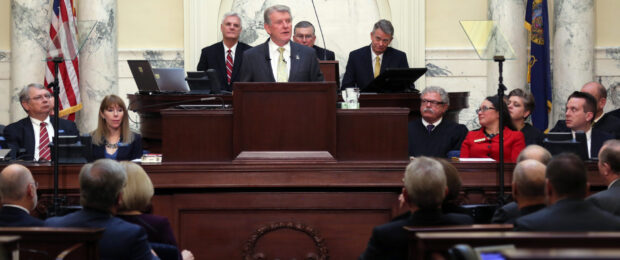Gov. Butch Otter used his final State of the State address Monday to position students and their education as the key to Idaho’s future.
“Most Idaho children who were in the first grade when I became governor are now starting their last semester of high school,” Otter said. “Every program, initiative and investment I mention here today is focused on providing those young men and women with a leg up on postsecondary education and career opportunities.”
Otter even paused his speech to recognize Boise student Holland Godby, who watched from the gallery above the House chambers. Godby is a recipient of the Idaho Opportunity Scholarship, and Otter used the shout-out as a call to expand the popular scholarship.

In his 12th and final year in office, Otter delivered an optimistic 55-minute speech, saying Idaho is “prosperous, positive and poised for even better times ahead.”
In conjunction with his speech, Otter unveiled his education spending recommendations. He called for increasing K-12 public school spending by just over 6 percent by investing in raises for teachers, expanding literacy intervention programs for struggling readers, paying for advanced educational opportunities for public school students and more.
By comparison, Superintendent of Public Instruction Sherri Ybarra called for increasing K-12 spending by almost 6.8 percent. The two proposals differ by $12.1 million.
As expected, Otter also put out a call to “upend the status quo” of higher education by creating a new, systemwide chief education officer who will coordinate and consolidate operations. Otter said dramatic changes are required to reach the “moonshot goal” of ensuring 60 percent of Idaho’s young adults earn a postsecondary degree or certificate. Idaho policymakers, including Otter, originally hoped to reach the 60 percent goal by 2020. But this year, his higher education task force pushed the goal’s deadline back to 2025.
Overall, Otter proposed a general fund spending plan of $3.68 billion. That represents a 6.6 percent increase over current levels.
Highlights from Otter’s agenda include:
- $41.7 million for a fourth consecutive year of raises for educators under the career ladder salary law.
- An additional $10 million for technology.
- An additional $8 million for advanced opportunities to help K-12 students accelerate their education.
- A new $6.5 million to fund the second phase of the literacy intervention program, designed to help readers in grades K-3.
- An additional $5 million for college and career counseling.
- A $5 million increase in the Idaho Opportunity Scholarship to help encourage Idahoans to continue their education after high school.
- $4 million for professional development training for teachers.
- $2 million in one-time funding for the STEM computer science initiative to support grants, work force development and computer science professional development.
- An additional $1.4 million for the second phase of Idaho’s mastery-based education program.
- A $769,500 line item for the higher education chief executive officer’s position.
In an interview after the speech, Ybarra came out in favor of Otter’s higher education CEO proposal.
“He talked in his State of the State about how this is going to be a huge change, and it’s not about the people, it’s about the system… that needs to change,” Ybarra said. “With the (higher education) task force recommendations coming out, that’s going to be a huge lift, and I think it’s a step in the right direction.”
Because Idaho has fallen well short of its 60 percent goal, House Speaker Scott Bedke said Otter was wise to call for changes to the system. Bedke said he was “very intrigued” by the higher education CEO proposal, and predicted the House would take a serious look at it.
Overall, Bedke said the current system of higher education serves about 42 percent of the population — the students who are already going on after high school — very well. But it clearly isn’t serving the entire state well, he said.
“I think there is a license to change things up when it comes to our higher education system,” Bedke said.
But Bedke conceded that merely creating a new CEO’s position isn’t likely to inspire any high school students to continue their education. Instead, the CEO would need to realize cost savings and then strategically invest that money wisely into the state’s higher education system in order to make a difference for students.
Finally, Otter called on the state to conform to the federal tax package that Congress and President Trump passed last month. Otter called for almost $200 million in state tax cuts. He would achieve much of those cuts by lowering income tax rates — individual and corporate — by .45 percentage points. Otter also called for an Idaho dependent tax credit of $85.
More reading: Otter delivers a commencement address of sorts. So how will it play out? An analysis.

